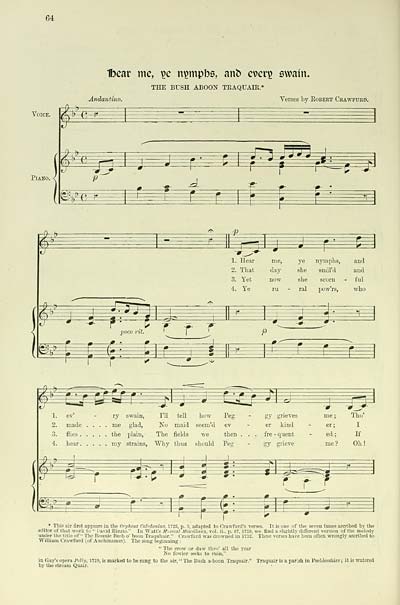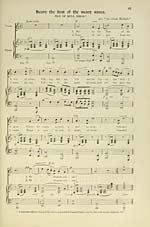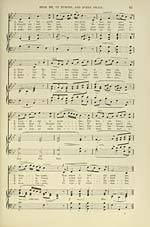Glen Collection of printed music > Printed music > Minstrelsy of Scotland
(84) Page 64 - Hear me, ye nymphs, and every swain
Download files
Complete book:
Individual page:
Thumbnail gallery: Grid view | List view

64
Ibear me, ^e n^mpbe, anb cx>cr^ swain.
THE BUSH ABOON TKAQUAIE.*
Andantino. Verses by Egbert Ckawfurd.
i
Voice.
t-P=^
s
i
a
^
S
=^
Piano.
j:i
^
fefcfi
^^3E
^
i
^
^
^^
1. Hear
2. That
3. Yet
4. Te
me,
day
now
ru
ye nymphs,
she smil'd
she scorn
ral pow'rs,
^-^^
and
and
ful
who
^=f
=^
r ^-
^
poco rit.
r -r
^
1^
f=
i^^s
=1
=P=st
Tho'
I
If
Oh!
Wr
1. ev' - ry swain, I'll tell how Peg
2. made .... me glad. No maid seem'd ev
3. flies the plain. The fields we then
4. hear my strains. Why thus should Peg
gy grieves
er kind
fre - quent
gy grieve
(.c ) f r
me;
er;
ed ;
me?
3=
\k+^ *-P
tr — &-
3:-^
:^s
^
-^ »^
^r
^
* This air first appears in the Orpheus Caledonius, 1125, p. 3, adapted to Cra^vfard's verses. It is one of the seven tunes ascribed by the
editor of that work to " David Eizzio." In TVatt's Musical Miseellamj, vol. ii., p. 97, 1729, we find a slightly diflerent version of tlie melody
under the title of " The Bonnie Bush o' boon Traquhair." Crawftrd was drowned in 1732. These verses have been often wrongly ascribed to-
WiUiani Cra^vfard (of Auchlnames). The song beginning :
" The crow or daw thro' all the year
ISo fowler seeks to ruin,"
in Gay's opera Polly, 1729, is marked to be sung to the air, ' ' The Bush a-boon Traquair." Traqualr is a parish in Peeblesshire ; it is watered
by the stream Quair.
Ibear me, ^e n^mpbe, anb cx>cr^ swain.
THE BUSH ABOON TKAQUAIE.*
Andantino. Verses by Egbert Ckawfurd.
i
Voice.
t-P=^
s
i
a
^
S
=^
Piano.
j:i
^
fefcfi
^^3E
^
i
^
^
^^
1. Hear
2. That
3. Yet
4. Te
me,
day
now
ru
ye nymphs,
she smil'd
she scorn
ral pow'rs,
^-^^
and
and
ful
who
^=f
=^
r ^-
^
poco rit.
r -r
^
1^
f=
i^^s
=1
=P=st
Tho'
I
If
Oh!
Wr
1. ev' - ry swain, I'll tell how Peg
2. made .... me glad. No maid seem'd ev
3. flies the plain. The fields we then
4. hear my strains. Why thus should Peg
gy grieves
er kind
fre - quent
gy grieve
(.c ) f r
me;
er;
ed ;
me?
3=
\k+^ *-P
tr — &-
3:-^
:^s
^
-^ »^
^r
^
* This air first appears in the Orpheus Caledonius, 1125, p. 3, adapted to Cra^vfard's verses. It is one of the seven tunes ascribed by the
editor of that work to " David Eizzio." In TVatt's Musical Miseellamj, vol. ii., p. 97, 1729, we find a slightly diflerent version of tlie melody
under the title of " The Bonnie Bush o' boon Traquhair." Crawftrd was drowned in 1732. These verses have been often wrongly ascribed to-
WiUiani Cra^vfard (of Auchlnames). The song beginning :
" The crow or daw thro' all the year
ISo fowler seeks to ruin,"
in Gay's opera Polly, 1729, is marked to be sung to the air, ' ' The Bush a-boon Traquair." Traqualr is a parish in Peeblesshire ; it is watered
by the stream Quair.
Set display mode to: Large image | Transcription
Images and transcriptions on this page, including medium image downloads, may be used under the Creative Commons Attribution 4.0 International Licence unless otherwise stated. ![]()
| Special collections of printed music > Glen Collection of printed music > Printed music > Minstrelsy of Scotland > (84) Page 64 - Hear me, ye nymphs, and every swain |
|---|
| Permanent URL | https://digital.nls.uk/91379126 |
|---|
| Description | Scottish songs and music of the 18th and early 19th centuries, including music for the Highland bagpipe. These are selected items from the collection of John Glen (1833 to 1904). Also includes a few manuscripts, some treatises, and other books on the subject. |
|---|
| Description | The Glen Collection and the Inglis Collection represent mainly 18th and 19th century Scottish music, including Scottish songs. The collections of Berlioz and Verdi collected by bibliographer Cecil Hopkinson contain contemporary and later editions of the works of the two composers Berlioz and Verdi. |
|---|

